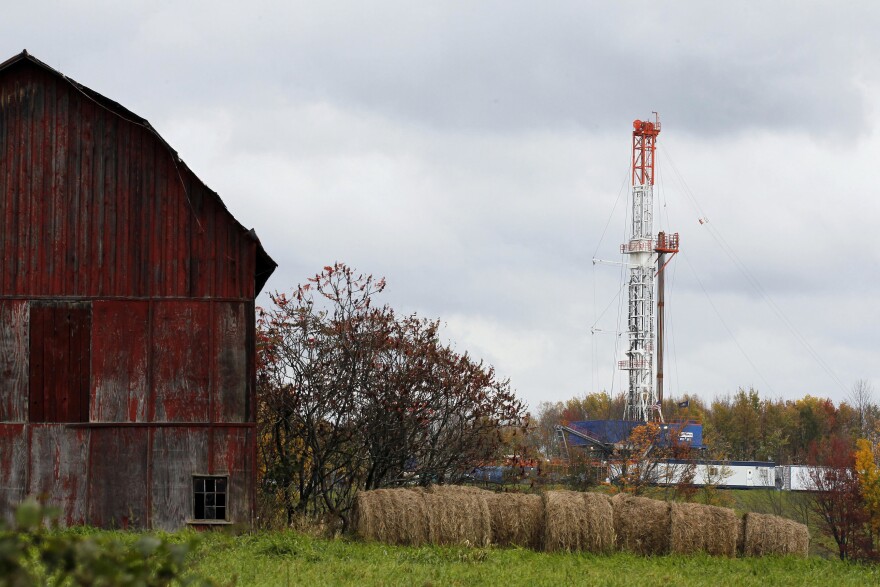This article answers a question submitted to StateImpact Pennsylvania. Have an energy question you want answered? Let us know here.
Question: In the Pennsylvania counties where drilling is abundant, when can local homeowners expect natural gas available to their homes? What is beign done at the state level about this? -Joyce Marr, Towanda
Let’s start with some numbers. About half of Pennsylvanians use natural gas to heat their homes, with most other residents using electricity, heating oil, propane, or wood.
Federal data shows 91,000 more Pennsylvania households used natural gas in 2017 than a decade ago.
Gas service is most common in big cities with a lot of potential customers. Elsewhere in the state, it’s spotty, including in parts of the Marcellus shale region. The irony isn’t lost on utilities.
“We have all this natural gas here under our feet in the Marcellus region,” said Luke Ravenstahl, vice president of sales and marketing for Peoples Gas. “It’s cheap, it’s affordable, and we firmly believe at Peoples that those that live here should have access to it.”
Gas, where it’s available, is among the most affordable ways to heat a home. The federal Energy Information Adminstration estimates gas customers in the Northeast, which includes Pennsylvania, will pay $700 for heat this winter, compared to $1,400 with electricity, $1,900 with propane and $1,600 with heating oil.
The price tag can go way up when someone wants gas service, but no lines exist near their residence.
Ravenstahl said Peoples, in the past four years, has deliberately tried to extend service in western Pennsylvania through a program called Go With Gas. A dozen projects have brought gas to communities in Cambria and Westmoreland counties.
He said it’s most feasible for the company to invest in new communities when many prospective customers commit to switching at once, and the new area is close to an existing pipeline.
Another gas company that operates in the Marcellus -- in the northeastern part of the shale play -- is looking to extend a pilot program approved by the Public Utility Commission in 2014.
UGI Utilities’ GET Gas program lets people spread out the cost of starting gas service over a 10-year period.
“The upfront cost of extending gas service is often prohibitive,” spokesperson Joseph Swope said.
It can run into the tens of thousands of dollars. Under GET Gas, people pay a surcharge up to $55 per month.
One of the program’s newest projects will extend service to up to 1,000 homes and businesses in Tunkhannock in Wyoming County.
“The idea is that GET Gas can serve as a spiderweb, that as you extend natural gas service out further from where you are, you reach this town and that means the next town is that much closer,” Swope said.
The pilot program expires soon, but Swope said the utility would like to extend it.
The PUC regulates gas utilities in Pennsylvania and has authorized several programs in recent years to extend service to more rural areas.
“As utilities started to come to the PUC with pilot programs for consideration, commissioners continued to encourage other utilities to examine those plans and come forward with their own ideas,” PUC spokesperson Nils Hagen-Frederiksen said.
A monthly surcharge hasn’t worked everywhere. Ravenstahl said Peoples found that residents balked at the idea. Columbia Gas of Pennsylvania, which operates mainly in western Pennsylvania, also has a similar program, but spokesperson Lee Gierczynski said the company will likely not continue it and instead focus on other incentives. The utility provides a free 150-foot mainline extension, as well as a $1,000 reimbursement for homeowners who need to complete internal piping work to hook up to gas.
“They’re very easy for customers to understand,” Gierczynski said.
The Legislature has also taken up the matter but with little success. One recent effort would have let gas utilities impose a fee on every customer’s bill to pay for new pipelines.
This story was produced in partership with StateImpact Pennsylvania, a collaboration between WESA, the Allegheny Front, WITF and WHYY to cover the commonwealth’s energy economy.




